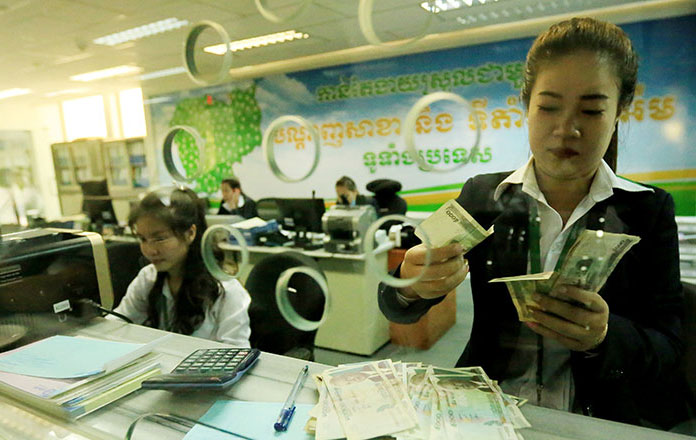Bankers Agree: 2018 A Great Year For Local Financial Sector

Despite uncertainty caused by the July general elections, 2018 was an excellent year in terms of business performance for a number of key players in the local financial sector.
Representatives of Acleda Bank and microfinance institutions Amret, Prasac, and Hattha Kaksekar Limited told Khmer Times that 2018 exceeded their expectations when it comes to important business performance indicators. Acleda, one of the largest commercial banks in the Kingdom, reported that outstanding loans and deposits rose by as much as 14 and 17 percent respectively last year.
“2018 has been one of the most prosperous years in terms of business growth,” said In Channy, the bank’s president, although he clarified that the first six months of the year were not particularly outstanding. “Growth in the first half of the year was very slow. We were facing a number of challenges: before the election, customers tended to wait and see, so the demand for loans was limited. Other bank products and services grew very slow as well,” Mr Channy.
However, Acleda chose to focus on improving the quality of its loan assets, prioritising risk mitigation, and upping investment on staff training to improve service quality, which, according to Mr Channy, paid off. “In the second half of 2018, non-performing loans (NPLs) shrank to less than 2 percent, and the bank started growing back at normal speed,” he added.
Amret, one of the largest MFIs in the country, reported a similar growth in loans – 14.5 percent – while their deposit expanded by 25 percent to reach $449 million. Mr Chea Phalarin, the MFI’s president and CEO, said, “Our deposits grew significantly because our customers have more trust in our services every year.
“In addition, Cambodia now has a sound macroeconomic policy and political stability, which is also helping build customer trust.” However, he explained that the outstanding loan growth rate was not impressive compared to 2017. “Outstanding loans did not grow much due to tough competition. Also, we put in place stricter rules for loan disbursement,” he said. NPLs accounted for just 0.3 percent of total loans in 2018, he added.
Huot Ieng Tong, president and CEO of Hattha Kaksekar Limited (HKL), the first company to issue corporate bonds in the Cambodian securities market, said loans and deposits both grew by 25 percent last year. “I don’t think the election had an impact on the operation of our business. The economy didn’t slow down, which is why we met our growth goals,” he said.
Another big fish in the MFI business, Prasac Microfinance Institution, also reported positive figures, with its loan portfolio growing by 27 percent, from $1.54 billion in 2017 to $1.96 billion at the end of last year. Deposits, meanwhile, grew by a whopping 40 percent.
“Prasac’s performance in 2018 was great thanks to the country’s rapid economic growth, macroeconomic and political stability, as well as support from the Central Bank, who issued strong regulation for the sector,” said Say Sony, Prasac senior vice president, who added that “all these factors have helped us boost customer trust.”
Like HKL’s Ieng Tong, Mr Sony said the elections did not influence their operations. “We still had access to finance, and customers still wanted to deposit their money with us,” he said.
In November, international credit rating agency Standard & Poor’s revised the Banking Industry Country Risk Assessment (BICRA) economic risk trend for Cambodia from ‘negative’ to ‘stable’. Despite the positive assessment, however, the agency warned that the sector remains “high risk” due to excessive loan growth.
Mr Channy says he is confident that 2019 will also be a great year for Cambodia’s financial sector. “We still have the three most important factors: economic, social and political stability, which are fundamental for growth in the financial sector.
“2019 will be one of the best years for Acleda Bank since, according to government and World Bank projections, the economy will continue to grow at a very fast pace,” said Mr Channy.